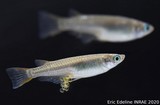REEF
 |
Productivity and Resilience Enhancement of Exploited Fish stocks: an experimental approach |
|
Research
Context and Issues
Worldwide, many fish stocks are in a state of serious decline or collapse. Additionally, collapsed stocks often fail to recover, even when the fishing effort is relaxed. This chronic overexploitation incurs severe economic costs and have ramifications to ecosystem function and services.Objectives
We argue that many of these problems arise because of an opposition between fisheries-induced selection, that targets fast-growing and large-sized individuals through the use of minimum-size limits, and natural selection that favours the same individuals. Instead, fisheries should act in concert with natural selection by selectively harvesting small-sized individuals through the use of maximum size limits. We predict that such a reverse-fishing regime should increase both the productivity and resilience of exploited stocks.Methodology
To test this general hypothesis, REEF proposes to use an experimental approach to specifically explore (i) how the classical vs. reversed fishing regimes drive changes in phenotypes and in the underlying molecular architectures that support trait evolvability, (ii) quantify whether and how phenotypic and molecular evolution caused by fishing have cascading effects into the food-web down to algae and, from there, on water quality and the carbon biological pump, (iii) whether and how fishing may change natural selection acting on exploited fish stocks.Expected Results
If successful, reverse fishing regulations will ultimately foster progress towards a restoration of marine ecosystems to their historical state, when top predators were larger and more numerous than today.Partners
Beatriz Diaz PauliSylvie Dufour
Charlotte Evangelista
Arnaud Le Rouzic
Leif Asbjørn Vøllestad
Finn-Arne Weltzie
People involved
 |
EDELINE Eric, Scientist Phone : +33 2 23 48 55 23 Email : eric.edeline@inrae.fr |
Partners
Youen Vermard, Ifremer Nantes EMH
Mathieu Woillez, Ifremer Brest LBH
Marie-Pierre Etienne, Institut Agro, Département Mathématique et Informatique
NOAA North West Fishery center, Seattle, USA
DTU Aqua, Copenhaguen, Danemark
